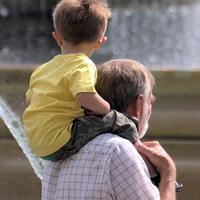In a society that focuses on individual needs and rights, the notion that intergenerational relationships underpin all human beings is challenging. Intergenerationality does not erase or diminish our individuality and identity - on the contrary has the potential to enrich it.
Throughout the life course, each generation is interdependent on other generations to survive and to evolve. Historically older generations and older people in general were seen as an important piece in the integral development of the younger generations’ lives. Indeed, in early stages of life, older generations are of vital importance as they provide the support we require from birth (Sánchez, Kaplan & Sáez, 2010). Human beings’ intergenerational bonds are crucial at the start but also throughout their entire life.
Likewise, older generations need younger generations in order to continue their personal development, to acquire new and diverse knowledge and to increase empathy. Dialogue and opportunities for interaction can elevate generations’ minds to a new way of thinking and understanding reality. This interdependent relational phenomenon brings to light our essence: as human beings, we are intergenerational. Hoffman (2003) states “Ubuntu Ngumuntu Ngbantu” which means “I am, because we are”. The capacity to put myself in the shoes of another generation requires a relational approach combined with a (inter) Generational Intelligence (Biggs & Lowenstein, 2010). Hence, encouraging relationships and communication among people of different generations requires a conscious effort. Never before has everyone had the opportunity to interact with four or more generations at the same time. Therefore, each generation has a role to fulfil on the intergenerational chain that binds us together. The essence of human beings is relational and we understand ourselves in relation with others.
On one hand, we could think that intergenerational communication potentially leads to misunderstanding and miscommunication due to the chronological distance between people from different generations. On the other hand, we are socialising in an intercultural and intergenerational arena. The familial arena is naturally an intergenerational setting as it is composed of people of large age differences who have also lived through different historical moments. When those differences are taken into account and applied to interaction, intergenerationality occurs.
This coming Saturday is grandparents’ day. The idea of this internationally recognised day is to draw attention to the role that grandfathers and grandmothers play in the lives of their grandchildren as well as the important values they impart to different social structures. In general, research has arguably increased knowledge in this field, especially on the role of grandmothers, typically assumed as having a closer relationship with their grandchildren. Thus grandparents have been conceptualised as an entity, which has possibly “caused researchers to shy away from considering grandfathers as a separate topic” (Mann, Tarrant & Lesson, 2015: 563). In addition, the same authors state “there have been extensive analyses of the family lives and intergenerational relationships of older people […]), but little direct attention to grandfathers within these” (p. 596). Moreover, with the additional opportunities for more generations to interact, a particular contribution from research would be to encourage closer relationships between great-grandparents and the younger generations. With this in mind, perhaps a great-grandparents day could allow the next generations the opportunity to explore this unique bond deeply.
References
Hoffman, J. MA (2003). What Motivates Intergenerational Practices in South Africa? Journal of Intergenerational Relationships, 1:1, 173-176, DOI: 10.1300/ J194v01n01_15
Mann, R., Tarrant, A., & Leeson, G. W. (2015). Grandfatherhood: Shifting Masculinities in Later Life. Sociology, 0038038515572586. http://soc.sagepub.com/content/early/2015/03/18/0038038515572586.abstract
Sánchez, M. Kaplan, M. & Sáez, J. (2010). Programas Intergeracionales: guia introductoria. Madrid: IMERSO. http://www.aepumayores.org/sites/default/files/Programas_Intergeneracionales_Coleccion_Manuales_Guias_IMSERSO_%202010.pdf
About the Author:
Cláudia Azevedo is a Visiting Fellow at the Oxford Institute of Population Ageing and the Research Officer for LARNA (Latin American Research Network on Ageing. Claudia is PhD student from Porto University, Portugal.
Comments Welcome:
We welcome your comments on this or any of the Institute's blog posts. Please feel free to email comments to be posted on your behalf to administrator@ageing.ox.ac.uk or use the Disqus facility linked below.
Opinions of the blogger is their own and not endorsed by the Institute
Comments Welcome: We welcome your comments on this or any of the Institute's blog posts. Please feel free to email comments to be posted on your behalf to administrator@ageing.ox.ac.uk or use the Disqus facility linked below.













